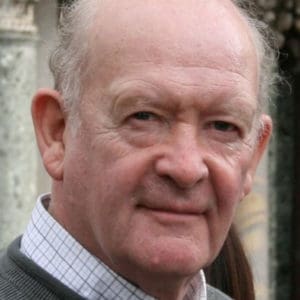The very reason why Christ sent out his love on the first Pentecost day was so that it could enter into all who would receive it. This love that would draw us up into his mystical body and then into his mystical contemplation of his Father was God’s plan from the beginning so that through contemplating his glory we would ultimately be drawn into that glory. When in human love a person gazes on God’s glory depicted in this man or that woman’s beauty, love wants to go further. It does not just want to gaze upon them but to enter into them and as fully as possible and for as long as possible.
A Lesson from Emily Bronte’s Wuthering Heights
This profound truth is perfectly portrayed in Emily Bronte’s Classic Romance Wuthering Heights. However, the word Romance is far too soft, too sweet, too sentimental to describe the potent primordial passions that drew the lovers, Heathcliff and Catherine together to become as one. Catherine can only describe her love, not just by saying that she loves Heathcliff, but that she is Heathcliff and he could say the same through his love for her.
Their ultimate desire for love which is the ultimate desire of all real lovers is perfectly depicted in the first film ever made that tried to portray this love on screen. When in death they were finally laid side by side, the individual wraiths of each rose from their tombs and merged into each other to become in death what they desired in life. Then as one, they went out into their beloved paradise, the bleak Yorkshire Moors where their love was first ignited.
Like all human love at its most profound, and at its most perfect, it desires an ongoing and ever-deepening oneness that is only bounded by eternity. When, on the night before he died, Jesus said, ‘Do you not believe that I am in the Father and the Father is in me?’ he was describing that love as it is in heaven, where all love that is briefly glimpsed in human love, finds its ultimate consummation.
The love that binds them together is the stuff that heaven is made of.
Only moments after describing this loving at-one-ment Jesus offers to share it with those who would follow him. He promises that if we truly love him then both he and his Father and the love who binds them together, will not only come to us but make their home in us, even in this life, so that his love will lead us on ‘from here to eternity.’
No One is Beyond Redemption
This is the ultimate destiny of all humankind; it is for all, and this has been the continual teaching of those who have followed in the footsteps of the disciples who first heard it in the Upper Room. The next day Jesus returned to the Paradise that he offers to all, with the thief who died with him, to make it clear that no one is beyond redemption. No one is beyond being born again to enjoy the life of infinite loving that can be briefly glimpsed through human love, as a promise of the divine love which is to come when we are invited to enter into the wedding to end all weddings because it never ends.
The ultimate consummation of loving then is union, not just with another human being, but with all other human beings in the love that called us into being from all eternity for that purpose. All that I have said about human love is true of divine love but in infinitely greater measure.
The person who learns to contemplate the glory of God does not just want to gaze upon that glory forever, but to enter into it for all eternity. The desire to do this has been implanted in us by God himself. Christ came, not just to tell us that this is possible, but to give us his love here and now so this promise can be brought about, beginning here on earth, so that it can be consummated in heaven, not just briefly, not just to the end of time, but to eternity.
Further to this, the ecstatic bliss that we experience does not render us senseless, but heightens all the senses like never before and grips our whole being, mind and heart, body and soul in the mystical and glorified body of Christ. Nor are we at any time static, but at all times dynamic, as the ecstatic bliss that we enjoy simply goes on and on deepening and expanding, as does our heart’s capacity to receive it.
The only word used to describe this was first coined by St Gregory of Nyssa, who in order to describe this ongoing rapturous bliss, coined the word ep-ecstasy for the ecstatic bliss in which we are more conscious than ever before goes on and on in such a way that we can finally come to experience, in some measure, the love without measure, that has bonded the Father to the Son from all eternity.
The Mystery of the Famous Icon by Andrei Rublev.
This is the profound mystery that the famous Russian iconographer Andrei Rublev tried to depict in his famous icon of the three angels seated around the table on which the Holy Grail stood, beneath the Oak of Mamre. They represented the Holy Trinity who came to tell Abraham that he was to be the Father of God’s own people, who would one day come to share in his own life. But the icon also represents the invitation to the viewer. The chalice represents that invitation. For whoever receives the body and blood of Christ is taken up into him to come to share in the life of the Three in One.
Contemplating that mystery in, with and through Christ, as the prelude to entering into it, is not an optional extra for a few pious souls, but the way God has designed for everyone from the very beginning to attain their ultimate destination. The vigilantes who set about stamping out contemplative prayer, good or bad, after the condemnation of Quietism was in effect undermining the only way to the union with God for all, for which we were created from the beginning. There may be many different forms of prayer that can lead a person into this contemplation, but there is no other way forward to union with God.
Contemplation is for All
Although he was primarily writing for the enclosed members of the Discalced Carmelite reform, John of the Cross makes it clear that contemplation is for all, as do all authentic mystical writers. Despite this teaching from ancient times the legacy of the vigilantes who have now been long forgotten lives on to this day in the impoverished spirituality for which they have been responsible. It has seeped into those who profess the old Scholastic Theology and the new Biblical Theology despite the fact that at the heart of both of these theologies mystical contemplation as the way to union with God is fundamental. Although this had been emphasized and underlined by the great spiritual theologian, Reginald Garrigou Lagrange OP, it has still not filtered down to students in the seminaries, never mind students in the schools or the laity in the pews, who still have to languish on what the spiritual theologian Louis Cognet called ‘Devout Humanism’.
From Paradise Lost to Paradise Regained
Well-meaning, but nevertheless pseudo-prophets are arising, as I write, to call the faithful back to the moral truths and certainties of the past and to bring back calm waters to save the Barque of Peter from the turbulent seas of feral liberalism that is threatening to destroy it. I use the word pseudo-prophets for two reasons. Firstly, because like all nostalgia, it is based on the myth that such a moral paradise existed only a short time ago, usually in the generation just before they were born. Secondly, because such a moral paradise can only be reborn as the external expression of a deep and profound mystical spirituality like the spirituality that Jesus first gave to the early Church through the first Apostles. I call it mystical because it matures in the mystical body of Christ himself, where we can be taken up to share in his contemplation of the Father. The moral paradise that we desire is the result or the byproduct of the contemplation that St Thomas Aquinas calls ‘the fruits of Contemplation’. The true prophets who we need to hear from then will not endlessly call us back to a moral paradise that we cannot conjure by human endeavor alone, but to that which comes from the grace of God. It is this grace that inspires true prophets, who like Our Lady, continually call people back to prayer, the prayer that she knows leads into true contemplation in with and through her son.
It is only his love given in this contemplation that can suffuse and surcharge our impoverished love with the only love that can lead us back from Paradise lost to Paradise regained. It is only here that moral perfection will be seen as the fruits of contemplation and in no other way. The only way that leads from Paradise lost to Paradise regained then is through the mystic way. It is in this way that we learn to carry our daily cross and embrace the white martyrdom of daily selfless giving inside and outside of prayer. This is the only way to rise with Christ from being the children of the Old Adam which we are, to the children of the New Adam to which we have been called, in the new Paradise of God’s Kingdom of Love.
Through Darkness to Light
When human lovers experience the love of their beloved, it always highlights the selfishness and sinfulness that makes them unworthy of the love they desire above all else. Inevitably mutual confession takes place as each wants to confess to the other their faults and failings with words like these. ‘You wouldn’t really love me if you knew what sort of person I really am.’ This is the beginning of the purification that must take place before the lovers can be united as they would wish. However, to achieve the desired effect it must be ongoing in a relationship that will be followed by further expressions of their selfishness and sinfulness, and pleas for mutual forgiveness, if the full union that they desire is to be consummated. It is the same for those who desire union with God, except of course it is only us who need forgiveness. I will shortly be detailing how to travel onwards through ‘the mystic way’ in my course on prayer.
Trinity by Andrei Rublev, Wikimedia Commons.




